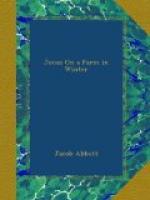Jonas turned his horses’ heads a little towards the road, and moved them on a step.
“Come, Franco,” said he; “Franco, come.”
Franco, hearing these words, and seeing that Jonas was actually going, seemed to come to a final decision. He leaped off the steps, and bounded down the road, through the gate, and jumped up into Jonas’s sleigh. Mr. Edwards continued to call him, but he paid no attention to it. He curled down before Jonas a moment, then he raised himself up a little, so as to look back towards the house; but he showed no disposition to get out again. Jonas put his hand upon his head, and patted it gently as he drove away; and, when he found that Franco was really going with him, he turned his head back, and said, with a look of great satisfaction,—
“Good-by, sir. I’m very much obliged to you.”
“Good-by, Jonas. Take good care of Ney.”
“Yes, sir,” said he, “I certainly will.”
“You’re a good dog, Franco,” he continued, patting his head, “to come with me,—very good dog, Franco, to choose the coarse hay for a bed under the old General’s crib, rather than that good warm carpet, for the sake of coming with me. I’ll make you a little house, Franco,—I certainly will, and I’ll put a carpet on the floor. I’ll make it as soon as I get home.”
And Jonas did, the next evening after he got home, make Franco a house, just big enough for him; and he found an old piece of carpet to put upon the floor. He put Franco in; but the next morning he found him in his old place under the General’s crib. Franco liked that place better. The truth was, it was rather warmer; and then, besides, he liked the old General’s company.
[Illustration]
CHAPTER V.
SIGNS OF A STORM
One evening early in February, the farmer told Jonas that his work, the next day, would be to get out four or five bushels of corn and grain, and go to mill. Accordingly, after he had got through with his morning’s work of taking care of the stock, he took a half-bushel measure, and several bags, and went into the granary. The granary was a small, square building, with narrow boards and wide cracks between them on the south side. The building itself was mounted on posts at the four corners, with flat stones upon the top of the posts, for the corners to rest upon.
The open work upon the side was to let the air in, to dry the corn; and the high posts and the flat stones were to keep the mice from getting in and eating it up.
Jonas put a short board across the top of the half-bushel, and sat upon it. Then he began taking the corn and shelling it off from the cob, by rubbing it against the edge of the board. As he sat thus at work, he occasionally looked up, and he could see out of the open door of the granary, into the farm-yards.




